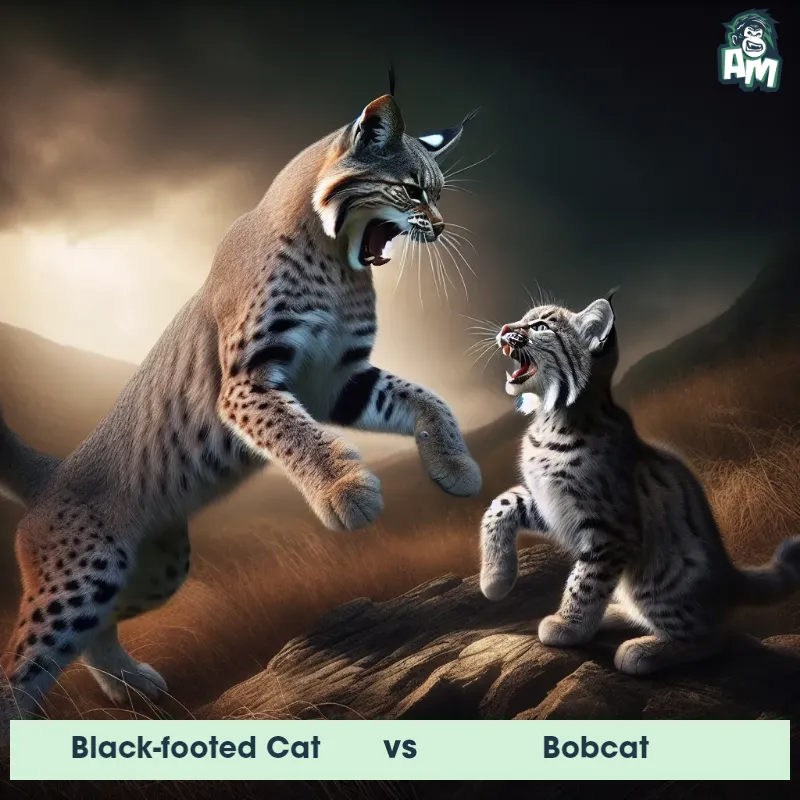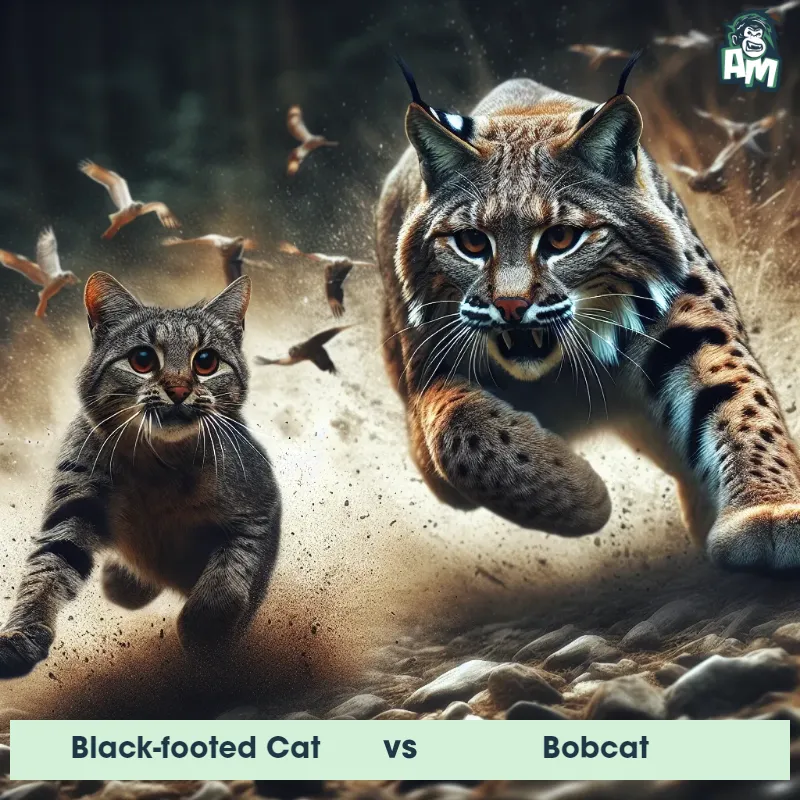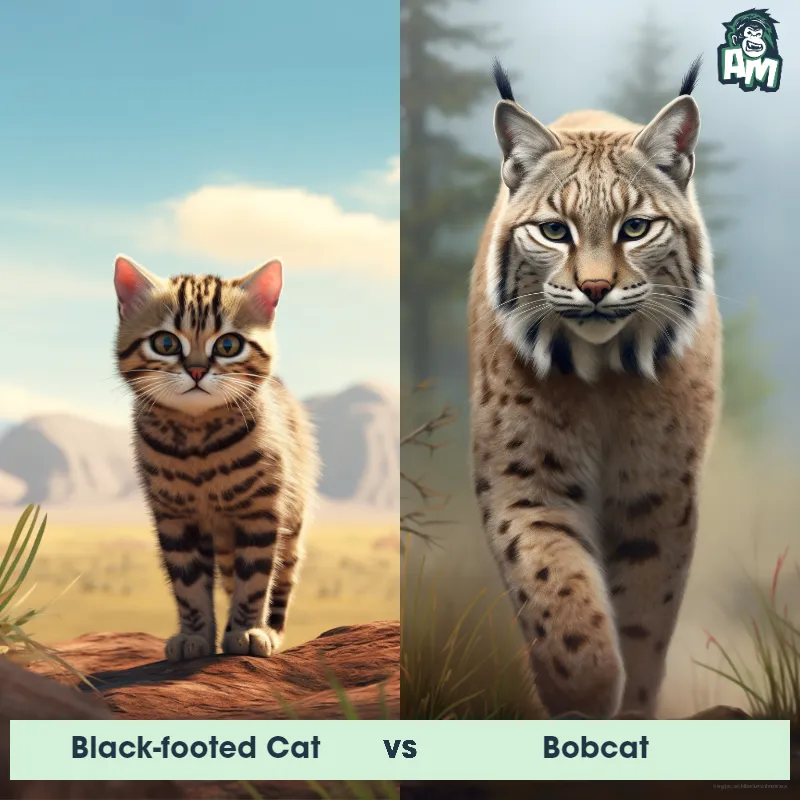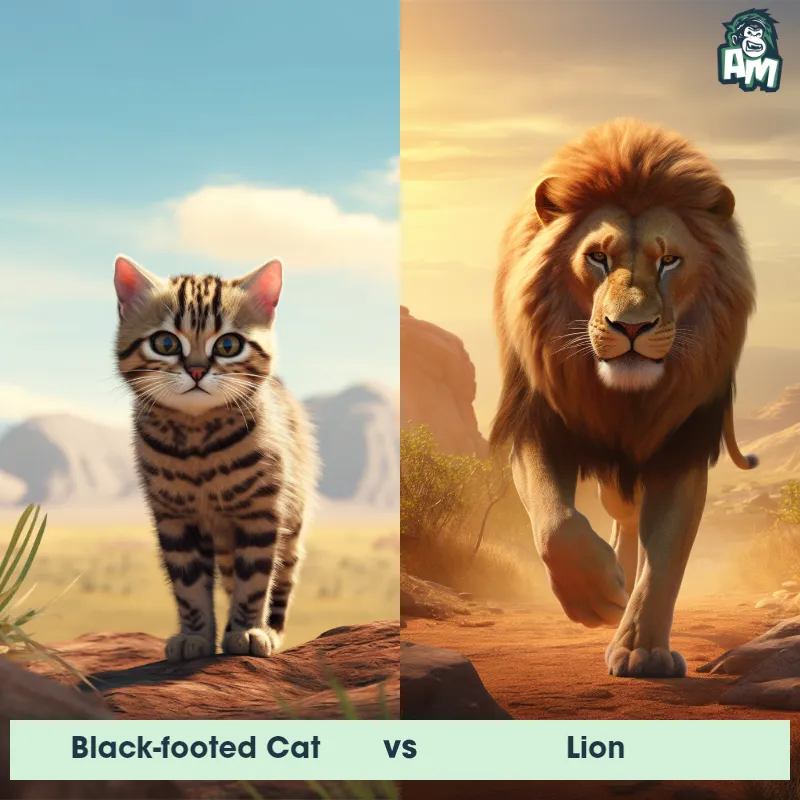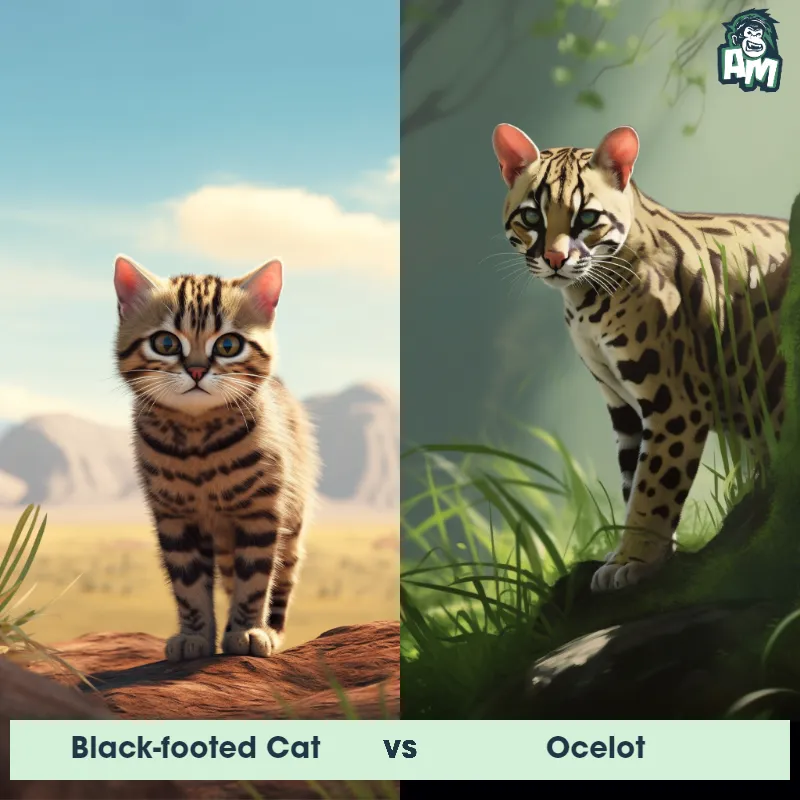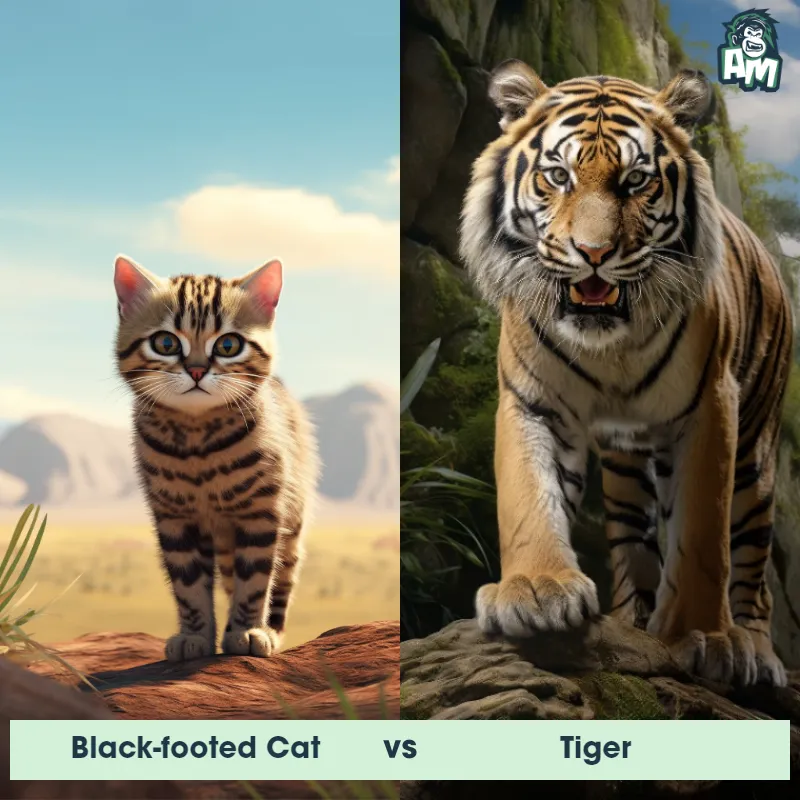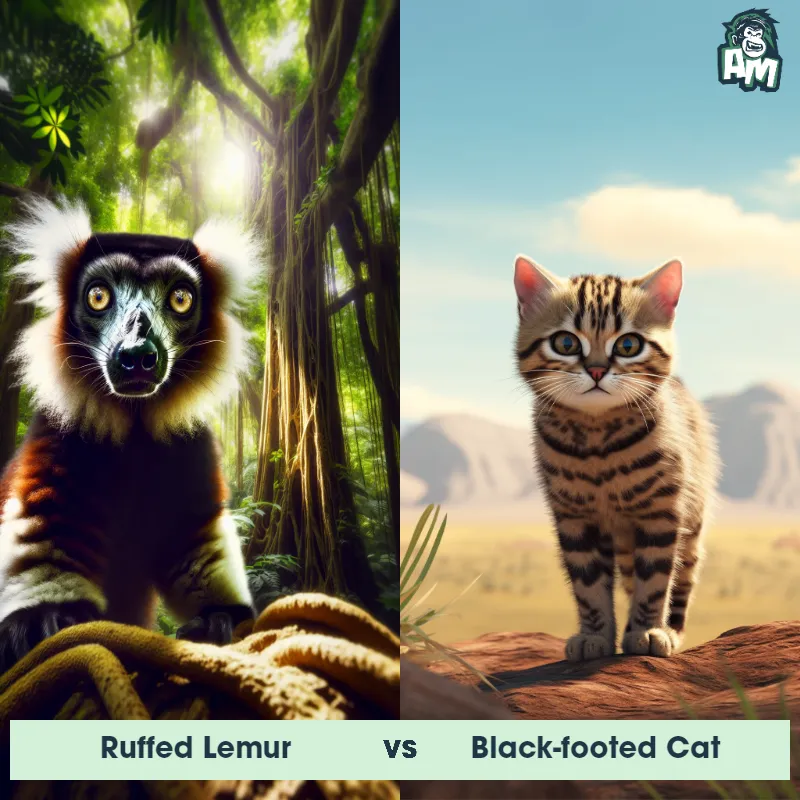The Black-Footed Cat
The Black-Footed Cat, also known as the small-spotted cat, is the smallest wild cat species in Africa, with an average body length of 38-52 centimeters and a weight of 1-2 kilograms. Its name is derived from the distinctive black coloration on the soles of its feet. This solitary and nocturnal predator has a stocky build, short legs, and a broad head with large rounded ears. Its fur varies from pale sandy-gray to reddish-brown, covered with numerous black spots, forming unique patterns for each individual. Despite its small size, this cat is an exceptional hunter and has been recorded to catch prey up to three times its own weight.
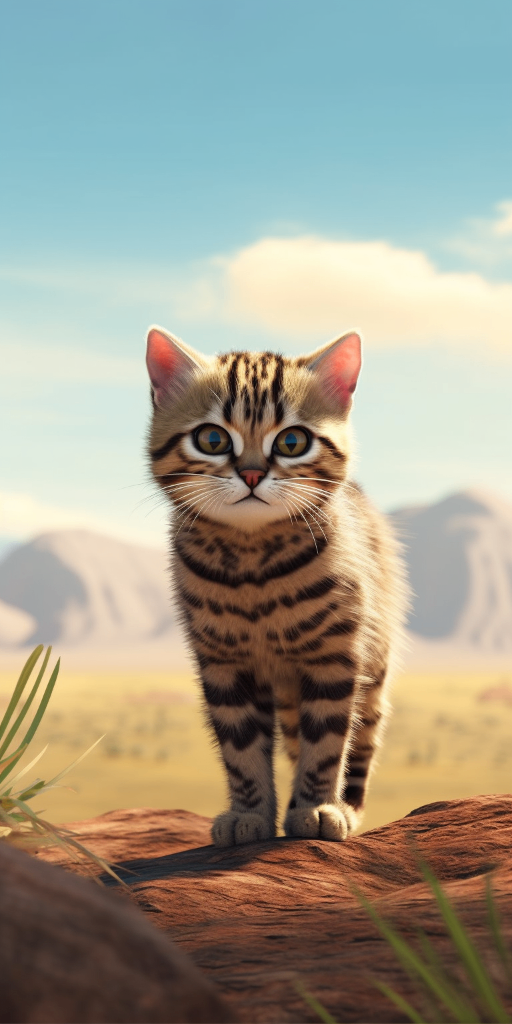
| Black-Footed Cat | |
|---|---|
| Size | 10 inches (25 cm) at the shoulder |
| Weight | 2-4 pounds (0.9-1.8 kg) |
| Speed | Speed: 30 mph (48 km/hr) |
| Key Strength | Agility and hunting skills |
| Biggest Weakness | Size and strength |
| Scientific Name | Felis nigripes |
| Family | Felidae |
| Habitat | Savannas and grasslands |
| Geography | Southern Africa |
| Diet | Small mammals, birds, and reptiles |
| Lifespan | 10 years - 14 years |

The Black-Footed Cat
The Black-Footed Cat, also known as the small-spotted cat, is the smallest wild cat species in Africa, with an average body length of 38-52 centimeters and a weight of 1-2 kilograms. Its name is derived from the distinctive black coloration on the soles of its feet. This solitary and nocturnal predator has a stocky build, short legs, and a broad head with large rounded ears. Its fur varies from pale sandy-gray to reddish-brown, covered with numerous black spots, forming unique patterns for each individual. Despite its small size, this cat is an exceptional hunter and has been recorded to catch prey up to three times its own weight.
Fun Fact: The Black-Footed Cat is considered one of the most effective hunters among all wild cats, with a success rate of 60-70% in capturing its prey, making it even more successful than larger predatory cats like lions and cheetahs.
| Black-Footed Cat | |
|---|---|
| Size | 10 inches (25 cm) at the shoulder |
| Weight | 2-4 pounds (0.9-1.8 kg) |
| Speed | Speed: 30 mph (48 km/hr) |
| Key Strength | Agility and hunting skills |
| Biggest Weakness | Size and strength |
| Scientific Name | Felis nigripes |
| Family | Felidae |
| Habitat | Savannas and grasslands |
| Geography | Southern Africa |
| Diet | Small mammals, birds, and reptiles |
| Lifespan | 10 years - 14 years |
Match Highlights
Black-Footed Cat Matchups
We use AI to simulate matchups between the Black-Footed Cat and other animals. Our simulation considers size, strength, and natural predatory behaviors to determine the most likely outcome.
Black-Footed Cat: Diet, Predators, Aggression, and Defensive Behaviors
What do Black-Footed Cats eat?
Black-Footed Cats are primarily carnivorous, with a diet consisting mainly of small mammals like rodents and birds. Black-Footed Cat are also known to prey on insects, reptiles, and occasionally small antelopes. Their hunting skills and agility help them capture prey efficiently.
Do Black-Footed Cats have any predators?
Despite being small predators themselves, Black-Footed Cats face threats from larger predators such as birds of prey, snakes, and other carnivores like jackals and wildcats. Due to their small size, Black-Footed Cat are vulnerable to being hunted by bigger animals.
Are Black-Footed Cats aggressive?
Black-Footed Cats have been observed to be quite territorial and can display aggressive behavior towards intruders, especially when it comes to defending their territory or young. Black-Footed Cat are known to hiss, spit, and even attack when threatened.
Do Black-Footed Cats fight?
When faced with a potential threat, Black-Footed Cats will not hesitate to engage in physical confrontation. Black-Footed Cat have sharp claws and teeth that Black-Footed Cat use in combat, especially when defending themselves or their offspring. However, Black-Footed Cat prefer to avoid fights whenever possible to minimize the risk of injury.
How do Black-Footed Cats defend themselves?
In addition to their aggressive behavior and physical combat skills, Black-Footed Cats also use their speed and agility to evade predators or threats. Black-Footed Cat are skilled climbers and can seek refuge in trees or shrubs when necessary. Black-Footed Cat rely on their camouflage and stealth to avoid detection.
What is the biggest weakness of Black-Footed Cats in a fight?
Despite their hunting prowess and defensive mechanisms, the biggest weakness of Black-Footed Cats in a fight is their small size and relatively fragile build. Black-Footed Cat are easily overpowered by larger predators and may struggle to defend themselves against more massive or stronger opponents. Their best defense is often to flee rather than engage in a potentially dangerous confrontation.
Fun Fact: The Black-Footed Cat has incredibly acute hearing, as its large ears enable it to detect the faintest sounds, making it an extraordinary predator of small nocturnal animals, including birds, rodents, and insects.
Fun Fact: Despite its small size, the Black-Footed Cat has a fierce temperament and has been observed to stand its ground and even fight off animals much larger than itself, such as jackals and caracals, when necessary for its survival.



